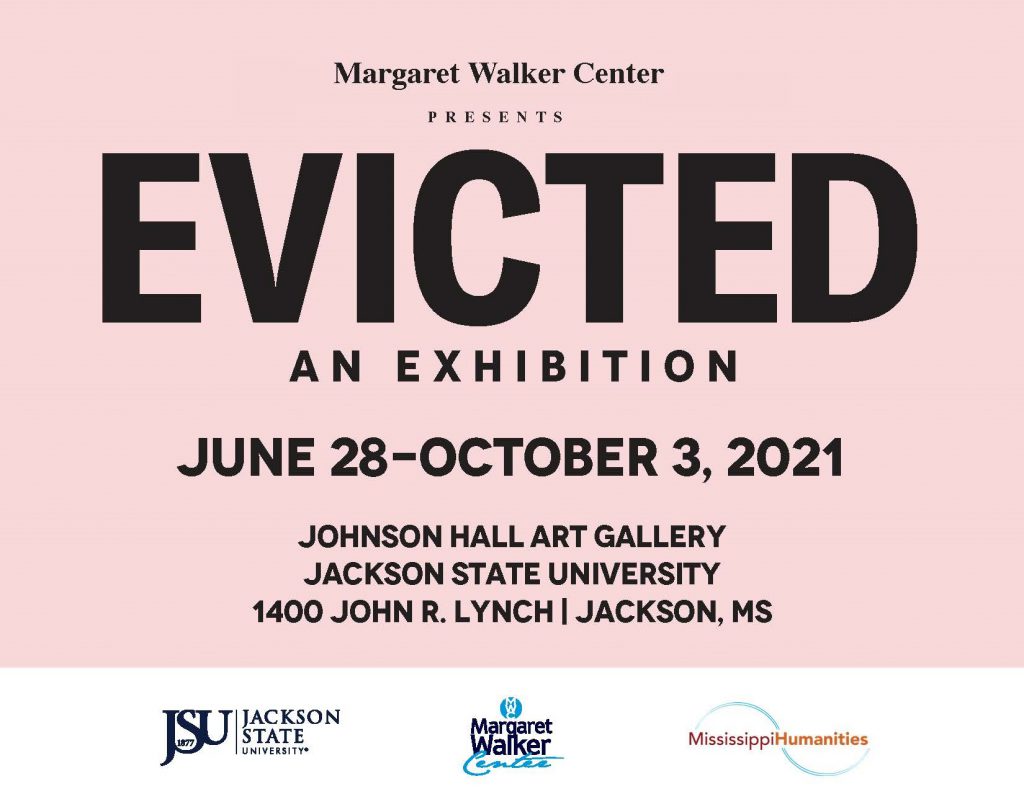 Programming
Programming
June 28, 2021: Exhibition Opening, Johnson Hall Art Gallery, Jackson State University
6:00 p.m., Thursday, July 1, 2021
Virtual opening conversation with Alieza Durana, Princeton Eviction Lab
Margaret Walker Center, Jackson State University
6:00 p.m., Thursday, July 22, 2021
Activism in the Face of Housing and Economic Insecurity
Dept. of Urban & Regional Planning, Jackson State University, Downtown Campus
Sarah Stripp, Springboard to Opportunities
Lorena Quiroz-Lewis, Immigrant Alliance for Justice and Equity
Silvina Barrera, Mississippi State School of Architecture, moderator
6:00 p.m., Thursday, August 12, 2021
Telling the Story of COVID-19 and Eviction
Margaret Walker Center Facebook
Nick Judin, Mississippi Free Press
Bracey Harris, NBC News
Robert Luckett, Margaret Walker Center, moderator
6:00 p.m., Thursday, August 26, 2021
Impact of Eviction on Children and Families:
The Resources Available
Margaret Walker Center Facebook
McKinney-Vento Homelessness Program, Jackson Public School District
Stewpot Community Services
Mississippi United to End Homelessness
Joan Wesley, Department of Urban and Regional Planning, moderator
6:00 p.m., Thursday, September 9, 2021
Eviction and the Law: Knowing Your Rights
School of Architecture, Mississippi State University, Jackson Campus
Mississippi Center for Justice
Southern Poverty Law Center
Mississippi State Representative
Kateryna Malaia, Mississippi State School of Architecture, moderator
6:00 p.m., Tuesday, September 28, 2021
The Intersection of Policy, Activism and Economic Well-Being
Hope Policy Institute, Mississippi NAACP,
Southern Rural Black Women’s Initiative, Children’s Defense Fund,
Mississippi Chapter of the National Association of Social Workers
Margaret Walker Center Facebook and YouTube
6:00 p.m., Tuesday, September 28, 2021
October 3, 2021
Exhibition closes and ships back to the National Building Museum
5:00 p.m., Saturday, October 16, 2021
School of Architecture, Mississippi State University, Starkville
Students and community partners listening party, oral history project
Exhibition Description
In April 2018, the National Building Museum opened a new, “eye-opening” exhibition exploring the causes and impacts of eviction, based on Matthew Desmond’s award-winning book Evicted. Since then, thousands of people have come through the show to learn more about the national eviction crisis.
A stable place to call home is one of the best predictors of success. Yet, each year more than 2.3 million Americans, most of them low-income renters, face eviction. While it used to be rare even in the poorest neighborhoods, forcible removal has become ordinary, with families facing eviction from the most squalid, barely inhabitable apartments. This phenomenon exposes not only income inequality in America, but also the growing separation between the built environments of the rich and the poor.
Housing instability threatens all aspects of family life: health, jobs, school, and personal relationships. Landlords hesitate to rent to those with eviction records, or charge them extra money, causing a devastating negative feedback loop. Children switch schools too often to make friends or be noticed and helped by teachers; neighbors cannot develop bonds; personal belongings are left in storage or out on the street. Americans often take home for granted—home forms the building blocks of community life—and this stability is under attack when eviction looms.
Specially commissioned visual infographics and forward-thinking design introduce visitors to the numbers and statistics they need to know in order to understand the crisis. Rates of evictions in different markets make evident the depths of the problem. Working together, these elements amplify tenants’ voices, as they explain in their own words the impact eviction has on them and their loved ones.
 Skip to main content
Skip to main content
